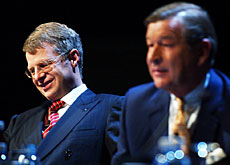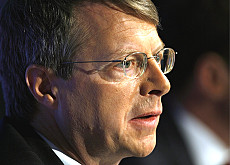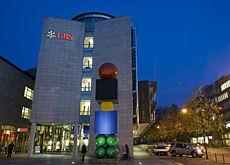Market baffled by Wuffli’s departure

The sudden and abrupt departure of UBS Chief Executive Peter Wuffli on Friday has left the markets wondering if he was pushed or if he jumped ship.
Wuffli was under pressure after losses in the US mortgage sector and the failure of hedge fund, Dillon Read Capital Management. But he was also rejected as chairman Marcel Ospel’s successor last week.
Wuffli, 49, had been chief executive of Switzerland’s largest bank since 2003 when his predecessor Luqman Arnold left following a dispute over strategy.
He had been credited with successfully building up UBS’s investment banking business in the US and its private banking operations in Europe. Last year the bank bought Brazilian wealth manager Banco Pactual, the brokerage business of Piper Jaffray and McDonald Investments in the United States.
But expansion came at a price, including the collapse of its hedge fund in May this year with crippling debts after just two years in operation.
“Wuffli is no doubt taking the fall for the Dillon Read Capital Management debacle,” Meredith Whitney, equity analyst at CIBC World Markets told the New York Times. “That was part of a succession of really negative events for the bank.”
Switzerland’s Bank Vontobel also noted the possible contribution of the hedge fund collapse to Wuffli’s departure. “The possibility of further losses by the DRCM hedge fund may have played a role,” the bank stated, referring to possible future costs relating to the disbanded hedge fund.
UBS also lost its investment banking arm president Ken Moelis this year after a dispute with Wuffli over the potentially risky funding of leveraged buyouts.
Sound record
But Wuffli’s overall record of guiding UBS to a position of greater strength internationally in the past four years has been praised by the markets. The former McKinsey consultant said he had no intention of leaving the bank, in a Financial Times interview last month.
“The bank did a tremendous job for several years by exceeding expectations but then last year they missed expectations in the third quarter,” Professor Hans Geiger of Zurich University’s Swiss Banking Institute told swissinfo.
“Ever since then they have lost a bit of glamour that was associated with their name, but UBS is still in very good shape. They have followed a good strategy by investing enormously in the last few years and have been building up their operations.”
Geiger does not believe the bad experience with the Dillon Read hedge fund was enough of a reason for Wuffli to go, speculating that he chose to leave after learning that the UBS board had last week rejected Ospel’s recommendation that he should be the next chairman.
“They lost SFr300-400 million and that’s two or three per cent of pre-tax profits. That’s a lot of money but compared to the whole it’s nothing and it’s certainly no reason to get rid of the CEO,” he said.
Pulled the plug?
“If the board chooses not to follow the advice of the chairman about who should succeed him then something very strange is happening. It is possible that Wuffli pulled the plug when he was told he would not be the chairman.
“I was extremely surprised and I couldn’t believe it. His sudden departure suggests to me that even the bank was surprised.”
UBS remains tight-lipped about the reason for Wuffli’s abrupt departure. “We are not going to discuss any further details in public,” Ospel said of Friday, adding that the board had made a decision it was “comfortable with”.
In the meantime Wuffli’s successor, private banking division president Marcel Rohner, has the job of steadying the UBS ship in choppy waters.
swissinfo, Matthew Allen with agencies
Financial figures 2006:
Net profit: SFr12.3 billion
Total net new money: SFr151.7 billion
Staff at the end of 2006: 78,140 (+8,571)
UBS was created in 1998 from the merger of Union Bank of Switzerland and the Swiss Bank Corporation.
The firm’s first major acquisition in 2000 was PaineWebber, the fourth-largest securities broker in the United States. This filled a strategic and regional gap in UBS’s wealth management business.
In June 2003, the bank adopted the single UBS brand for all its major businesses.
UBS oversees more than SFr.3.1 trillion ($2.6 trillion) in assets and wealth, making the world’s largest keeper of rich people’s fortunes.
Private banking accounts for more than 40% of UBS revenue.

In compliance with the JTI standards
More: SWI swissinfo.ch certified by the Journalism Trust Initiative



You can find an overview of ongoing debates with our journalists here. Please join us!
If you want to start a conversation about a topic raised in this article or want to report factual errors, email us at english@swissinfo.ch.